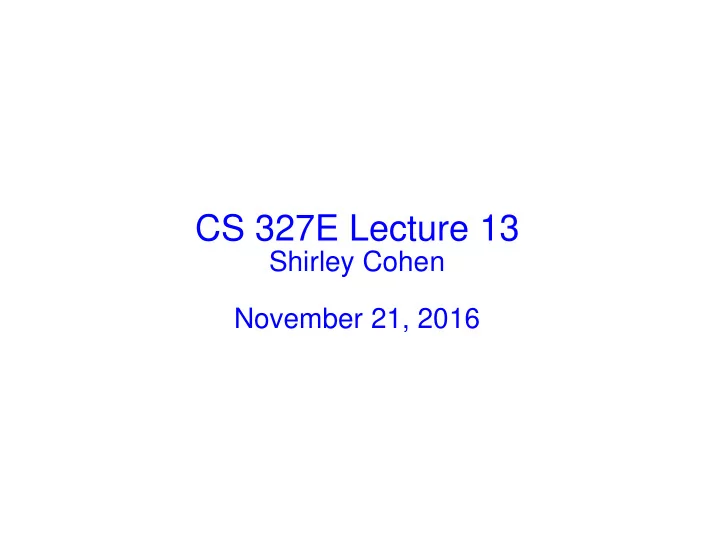

CS 327E Lecture 13 Shirley Cohen November 21, 2016
Plan for Today • Reading Quiz • MySQL + JSON • Final Project Assignment
Readings for Today • JSON Data Type from the MySQL Reference Manual (section 12.6) • JSON Functions from the MySQL Reference Manual (section 13.16)
Question 1 Which of the following statements is false about MySQL support for JSON: A. MySQL has a native JSON datatype B. MySQL converts JSON documents to a binary format C. MySQL indexes JSON documents directly D. MySQL supplies a number of functions for operating on JSON data E. MySQL automatically validates JSON documents that are stored in JSON columns
Question 2 In the context of JSON, normalization means the process of removing duplicate keys (or names) from a document. A. True B. False
Question 3 What does the path expression below evaluate to? $.retweeted_status.entities. user_mentions[0].indices[0] A. {} B. 75 C. NULL D. 91 “id” : 104481993 E.
Question 4 Let j be to the JSON document shown. What does the select statement below evaluate to? select JSON_EXTRACT(j, '$.retweeted_status.entities. user_mentions[0].id'); A. "indices" : [75, 91] B. 75 C. 91 D. 104481993 E. None of the above
Question 5 Let j be the JSON document shown. What does the select statement below evaluate to? select JSON_SEARCH(j, 'one', 'RT'); A. "$.text" B. "$.*" C. {} D. NULL E. None of the above
Demo 1
UT Class Enrollment & Twitter
New DDL
Twitter Client
Demo 2
Concept Question 1 We want to extend the Twitter Client to check for duplicate tweets before doing the insert into MySQL. Assume that in Python we extract the id of the tweet and store the value in the variable $ id . How can we formulate a SQL query that checks for duplicate tweets given $id ? A. select count(*) from Tweet where tweet_id = $id B. select * from Tweet order by tweet_id C. select count(distinct tweet_id) from Tweet where tweet_id = $id D. select * from Tweet where tweet_id = $id E. select count(tweet_id) from Tweet where tweet_id = $id
Concept Question 2 We want to implement a more accurate count of tweets per UT major. More specifically, we want to filter out all retweets and only add up the origin tweets. Assume that for all tweets, we extract the origin tweet id from the tweet and we store this value in a new field called Tweet.origin_tweet_id . How can we modify the query below to only count unique tweets? select m.name, m.code, count(t.tweet_id) as tweet_count from Major m left outer join Tweet t on m.code = t.major_code group by m.name, m.code order by tweet_count desc; A. Replace: count(t.tweet_id) with: count(t.origin_tweet_id) B. Replace: count(t.tweet_id) with: count(distinct t.origin_tweet_id) C. Change the outer join to an inner join D. Change the left outer join to a right outer join E. None of the above
Final Project http://www.cs.utexas.edu/~scohen/project/final_project.pdf
Recommend
More recommend